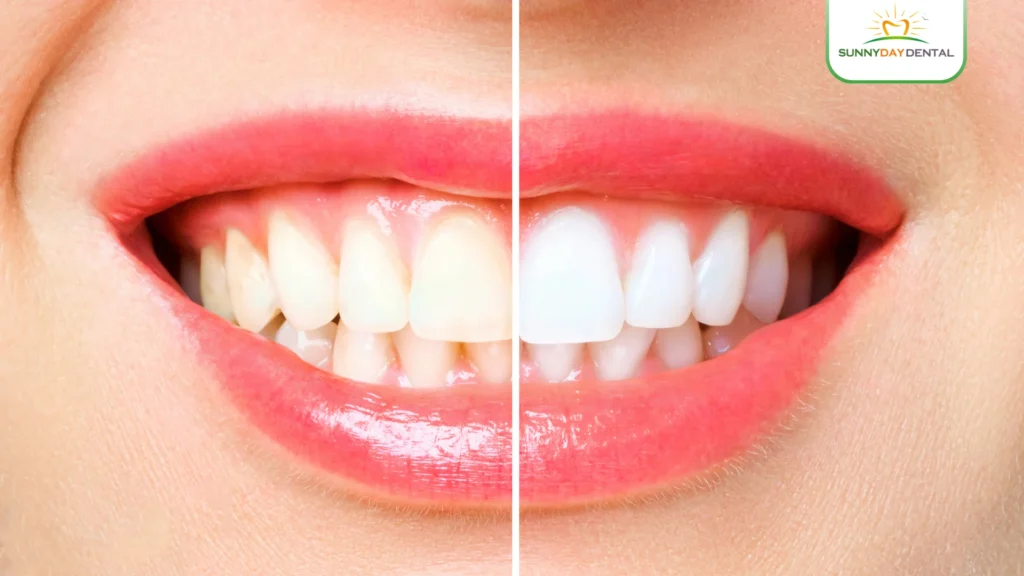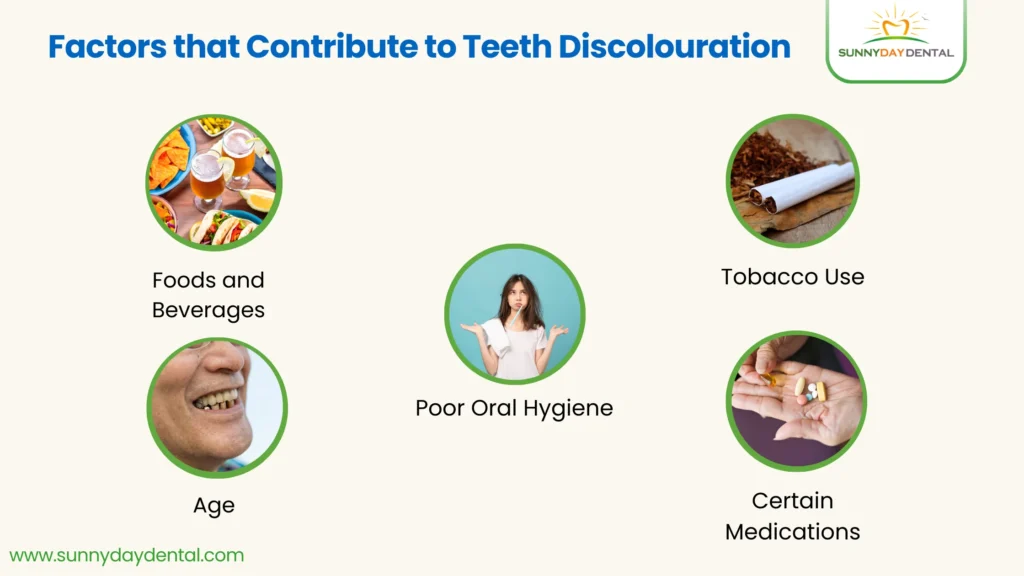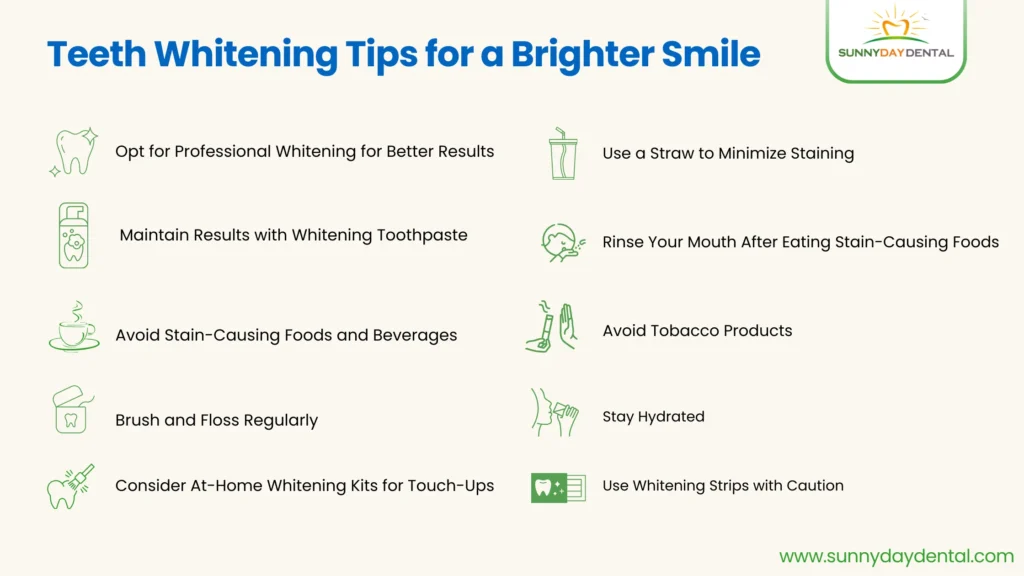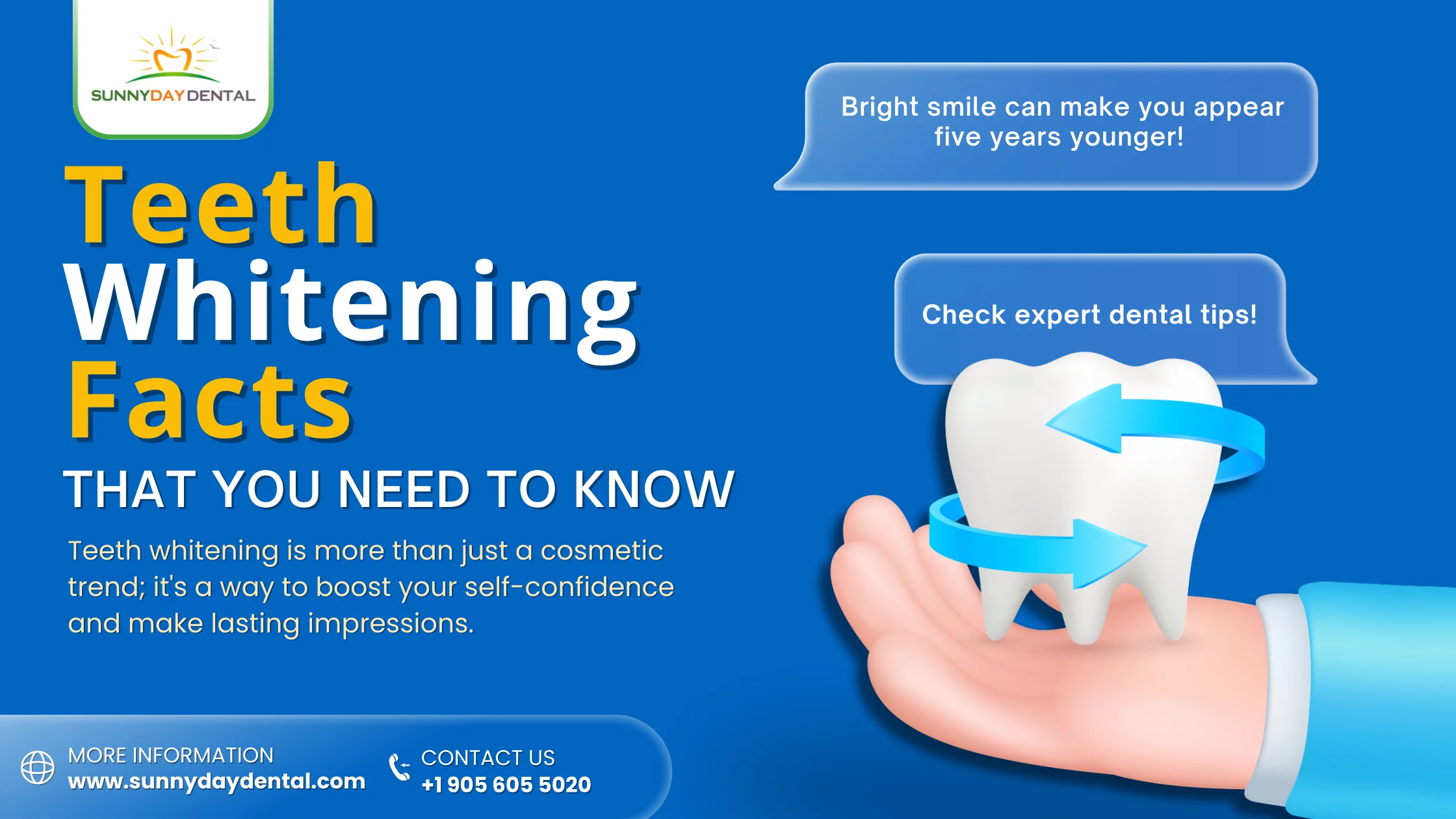Did you know that a bright smile can make you appear up to five years younger?
It’s true! Teeth whitening is more than just a cosmetic trend; it’s a way to boost your self-confidence and make lasting impressions. Whether you’re considering professional whitening or at-home remedies, there are essential teeth whitening facts that can guide you toward safer, more effective results.
In this comprehensive guide, we’ll dive deep into everything you need to know about teeth whitening facts, along with expert tips to keep your smile radiant.
What is Teeth Whitening?

Teeth whitening is a popular cosmetic dental procedure that removes surface stains from the enamel, making teeth appear brighter and whiter. The process involves the use of bleaching agents, such as hydrogen peroxide or carbamide peroxide, which penetrate the tooth’s surface to break down stains. Teeth whitening facts show that both professional treatments and over-the-counter products can improve the color of your teeth, but the results, safety, and longevity can vary based on the method you choose.
The Science Behind Teeth Whitening
Understanding the science behind teeth whitening can help you make informed decisions. Enamel, the hard outer layer of your teeth, contains tiny pores that absorb pigments from food, drinks, and other substances. Over time, these pigments build up, causing discoloration.
Why Do Teeth Become Discolored?

Several factors contribute to tooth discoloration:
- Foods and Beverages: Dark-colored foods like berries, and beverages like coffee, tea, and red wine, are known for staining teeth.
- Tobacco Use: Smoking or chewing tobacco leads to yellowing of the teeth, as nicotine and tar stick to the enamel.
- Age: The natural aging process results in the thinning of the enamel, making the yellowish dentin layer underneath more visible.
- Medications: Certain medications, especially antibiotics like tetracycline, can cause deep stains when used during childhood.
- Poor Oral Hygiene: Inadequate brushing and flossing allow plaque and stain-causing substances to remain on the teeth.
Teeth Whitening Facts: What You Need to Know
When it comes to teeth whitening, there are numerous myths and misconceptions. Here are some crucial teeth whitening facts that separate myths from reality:
1. Fact: Professional teeth whitening is more effective than DIY methods.
While over-the-counter products can provide some whitening, professional treatments deliver faster and more noticeable results.
2. Fact: Not all teeth respond the same to whitening.
Teeth with yellow stains usually respond better to whitening treatments than teeth with brown or gray tones.
3. Fact: Teeth whitening results are not permanent.
Depending on lifestyle and oral hygiene, the effects of teeth whitening can last anywhere from six months to two years.
4. Fact: Whitening treatments do not work on dental restorations.
Crowns, veneers, and fillings do not change color with bleaching agents, which only work on natural teeth.
5. Fact: Sensitivity after whitening is temporary.
Tooth sensitivity can occur post-treatment but usually subsides within a few days. Dentists often recommend using desensitizing toothpaste before and after whitening.
The Types of Teeth Whitening Treatments
1. In-Office Whitening
In-office treatments provide the fastest and most noticeable results. During the procedure, a dentist applies a high-concentration bleaching gel to the teeth, often activated by a special light. In-office whitening can make your teeth up to 8 shades whiter in just one session.
2. At-Home Whitening Kits from Dentists
These kits include custom-fitted trays and bleaching gel, allowing for gradual whitening over a few weeks. The custom trays ensure even distribution of the gel, leading to more consistent results.
3. Over-the-Counter Whitening Products
Products like whitening strips, gels, and rinses are available at pharmacies. While they can provide mild whitening, they are less effective than professional treatments and may take longer to achieve results.
4. Natural Whitening Remedies
Some natural remedies, such as oil pulling with coconut oil or using baking soda, can have mild whitening effects. However, these methods should be used cautiously and under a dentist’s guidance.
Teeth Whitening Tips for a Brighter Smile

If you want to achieve and maintain a whiter smile, consider these essential teeth whitening tips:
1. Opt for Professional Whitening for Better Results
Professional teeth whitening in Woodbridge offers safe, fast, and effective results. Dentists use higher concentrations of bleaching agents under controlled conditions, which leads to dramatic whitening.
2. Maintain Results with Whitening Toothpaste
Whitening toothpaste can help maintain the brightness achieved through professional treatments. These toothpastes contain mild abrasives that remove surface stains and prevent new ones from settling.
3. Avoid Stain-Causing Foods and Beverages
Limit the consumption of coffee, tea, red wine, and dark sodas, as these beverages contribute significantly to tooth discoloration. If you must indulge, consider using a straw to minimize contact with your teeth.
4. Brush and Floss Regularly
Maintaining good oral hygiene is one of the most effective teeth whitening tips. Brushing twice a day and flossing once daily help remove plaque and prevent surface stains.
5. Consider At-Home Whitening Kits for Touch-Ups
At-home whitening kits prescribed by dentists offer a convenient way to touch up your smile between professional treatments. These kits use custom-fitted trays and safe levels of bleaching agents.
6. Use a Straw to Minimize Staining
Drinking dark beverages through a straw can reduce their contact with your teeth, helping prevent stains and prolonging whitening results.
7. Rinse Your Mouth After Eating Stain-Causing Foods
Rinsing your mouth with water after consuming staining foods can prevent pigments from adhering to your enamel, keeping your teeth brighter.
8. Avoid Tobacco Products
Tobacco is a major cause of tooth discoloration. Quitting smoking or chewing tobacco not only benefits your oral health but also keeps your smile whiter.
9. Stay Hydrated
Drinking plenty of water not only keeps your body hydrated but also washes away food particles and bacteria that can contribute to staining.
10. Use Whitening Strips with Caution
Over-the-counter whitening strips can be effective, but they should be used as directed to avoid sensitivity or uneven results.
Top Teeth Whitening Tips
What are the Best Teeth Whitening Tips?
For effective whitening, choose professional treatments, maintain results with whitening toothpaste, limit stain-causing foods, and practice consistent oral hygiene.
Rise and Shine with that Brighter Smile
If you’re looking to enhance your smile, Sunny Day Dental in Woodbridge, Canada, offers expert teeth whitening treatments tailored to your needs. From in-office whitening to professional at-home kits, we provide safe and effective options to achieve a radiant smile.
Book your consultation today at www.sunnydaydental.com and discover the difference professional care can make!
FAQs
- How long does it take to see results from teeth whitening?
Results vary depending on the method used. In-office treatments typically show immediate results, while at-home kits may take up to two weeks for noticeable changes. - Are there any side effects of teeth whitening?
Temporary tooth sensitivity and gum irritation are common side effects of teeth whitening. These usually subside within a few days post-treatment. - How often should I whiten my teeth?
Professional teeth whitening is typically recommended once a year, with touch-ups as needed. Over-whitening can damage enamel, so it’s best to consult your dentist. - Can I whiten my teeth naturally?
While natural remedies like baking soda or oil pulling can have mild effects, they are not as effective as professional treatments. It’s always safer to seek a dentist’s advice. - Does diet impact teeth whitening results?
Yes, consuming stain-causing foods like coffee, wine, and berries can diminish whitening results over time. A balanced diet and good oral hygiene help maintain a brighter smile.

